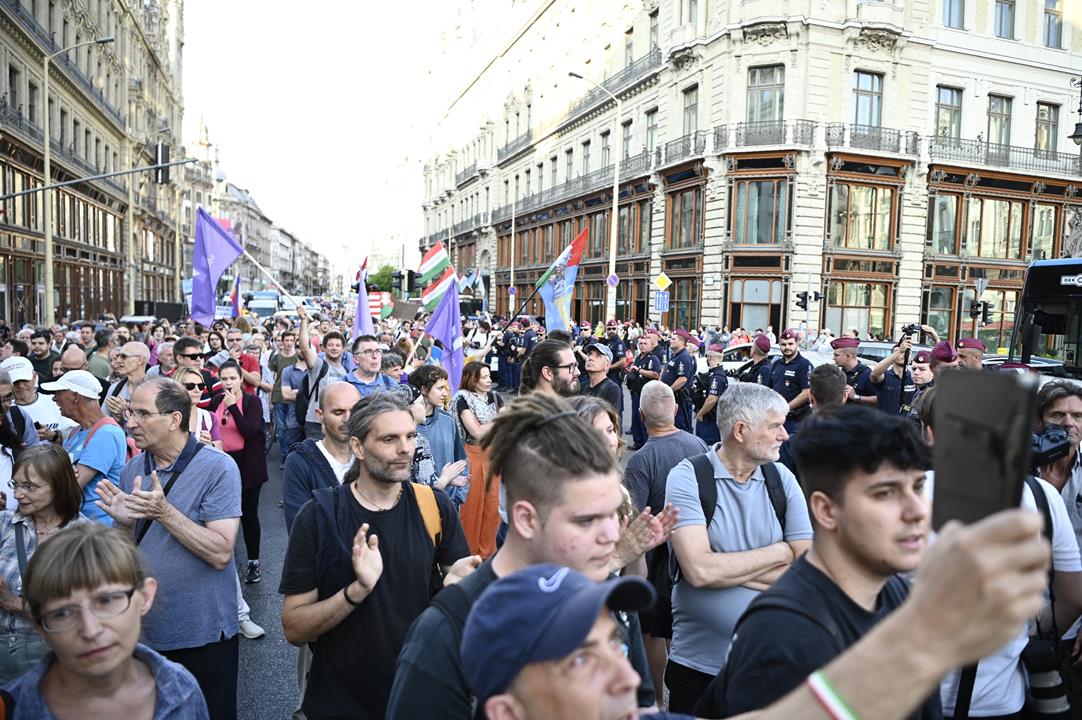UN rights chief warns because of the shrinking civic space in Hungary, Georgia, El Salvador

UN High Commissioner for Human Rights Volker Türk on Monday compared the rights of the Hungarian civil society to the El Salvador. In El Salvador, the presidency of Nayib Bukele enjoys significant popular support and has implemented strong measures to combat crime. However, his critics argue that some of his actions have undermined democratic institutions and checks and balances.
Shrinking civic space in Hungary, says the UN rights chief
According to the Turkish Anadolu News Agency, UN High Commissioner for Human Rights Volker Türk on Monday voiced deep concern over growing repression around the world. He warned that civic space is shrinking under new laws targeting civil society and independent media in countries such as Georgia, El Salvador, and Hungary. In India-administered Kashmir, he condemned the recent attack near Pahalgam and called on both India and Pakistan to uphold the ceasefire and restore water-sharing arrangements. “In parts of the Russian Federation and the United States, there are severe restrictions on women’s reproductive rights,” he noted, calling for the global implementation of gender quotas in politics.

Concerns over escalating Israel-Iran conflict
He also expressed deep concern over the recent military escalation between Israel and Iran, calling for restraint and a return to diplomacy. “The military escalation between Israel and Iran is deeply worrying,” Türk said as he presented his annual report to the 59th Human Rights Council in Geneva. He urged all parties to engage in “urgent diplomatic negotiations to end these attacks and find a way forward.”
The UN rights chief issued his starkest criticism toward the suffering inflicted on Palestinians in Gaza by Israel, saying: “Israel’s means and methods of warfare are inflicting horrifying, unconscionable suffering on Palestinians in Gaza.” Türk accused Israel of “weaponizing food and blocking life-saving aid,” and called for “immediate, impartial investigations into deadly attacks on desperate civilians trying to reach food distribution centers.”
Palestinians in danger
He expressed alarm at the “disturbing, dehumanizing rhetoric from senior Israeli government officials,” warning that such language is “reminiscent of the gravest of crimes.” He also criticized Israel’s restrictions on press access in Gaza, stating that its refusal “to allow international journalists to report from Gaza has helped its armed forces and Hamas to avoid transparency and accountability.” Calling for urgent action, he said: “All those with influence must exert maximum pressure on Israel and (the Palestinian group Hamas) to put an end to this unbearable suffering.”
Turning to the situation in the occupied West Bank, Türk noted that “no day passes without attacks by Israeli security forces and settlers killing, detaining and forcibly displacing Palestinians.” He concluded by stressing the urgent need for a political solution. “Only an immediate ceasefire leading to a two-state solution, with Gaza as an integral part of a Palestinian state can offer sustainable peace.” He also called for the immediate and unconditional release of all Israeli hostages and the release of Palestinians detained arbitrarily.
Lebanon, Sudan, Ukraine
Türk also raised alarm over the widening impact of the conflict on Lebanon, citing Israeli air and drone strikes that “have killed civilians and destroyed homes and medical facilities.”
He called for full respect of the ceasefire and urged international support for Lebanon’s reconstruction and much-needed reforms.
In Sudan, he described a deteriorating human rights catastrophe, with a documented tripling of civilian killings between February and April. He decried “widespread sexual violence, including against children,” and called for a halt to arms flows and an end to business interests fueling the conflict.
In Ukraine, he reported a sharp increase in civilian casualties and urged both the Russian Federation and Ukraine to commit to a “full exchange of prisoners of war” and a ceasefire aligned with international law.
Worsening inequality, food security
The high commissioner warned of worsening inequality and food insecurity, particularly in the least developed countries hit hardest by global debt and climate change.
He said recent tariffs could “put healthcare, education, and a nutritious diet out of reach for many” and risk reversing gains in gender equality and poverty reduction.
Turning to digital technologies, he cautioned that artificial intelligence, if unregulated, could “widen digital divides” and enable mass surveillance. “Innovation that ignores human rights has led to terrible consequences,” he said, urging states to adopt legal frameworks based on transparency and accountability.
Türk concluded with a strong defense of the international human rights system and warned against attacks on the International Criminal Court and other UN mechanisms.
He also called recent funding cuts “an assault on the rule of law” and urged states to stand up for human rights “in word and deed.”
“Populists and authoritarians are working hard with their so-called culture wars to distract people from today’s very real problems,” he said. “But there is an alternative. It lies in more human rights, not less.”
Source: Anadolu News Agency






